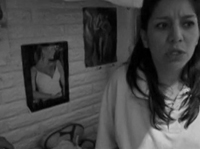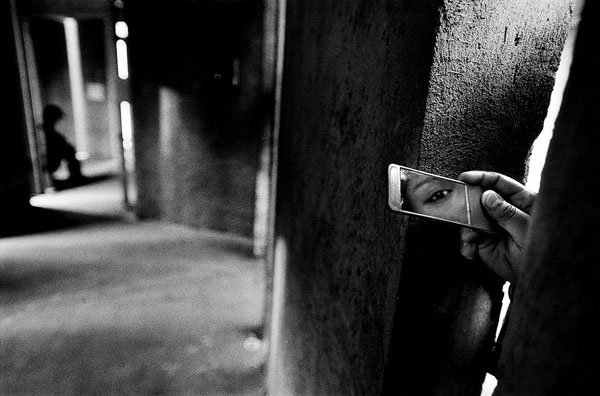La cárcel de mujeres es algo más que el lugar donde la sociedad esconde sus errores y repara sus culpas. La prisión encierra cientos de historias de abandono, maltrato, amores incondicionales; historias contadas repetidamente como una letanía dolorosa que no se puede olvidar.
Para entrar hay que recorrer un largo túnel que conduce a un mundo femenino, sin colores vivos, sólo el beige y el azul marino de los uniformes. Un sello invisible sobre el antebrazo hace la diferencia entre los que van de visita por un rato y quienes se quedan a cumplir largas sentencias o simplemente nunca salen. “Llevo siete años, cuatro meses y dos semanas”. Cuentas exactas, interminables. Tiempo que transcurre lento. Horas negras.

Al cruzar la reja, los objetos adquieren otro valor; ya sea porque no están permitidos, como es el caso de tijeras y perfumes, o porque sin dinero resulta muy difícil adquirir productos básicos como jabón, desodorante o un rollo de papel de baño. Tampoco pueden introducir retratos ni cámaras fotográficas.
Las únicas referencias de las transformaciones que la cárcel ha marcado en sus rostros son la memoria y los espejos.
Una tarjeta telefónica es oro molido, pues el teléfono se convierte en uno de los contados recursos para mantener contacto con el exterior. La visita familiar representa un hecho especial. Es aire fresco, libertad que viene de afuera: un abrazo envuelto para regalo. Aunque, como sentencia moral a sus actos, es común que las reclusos sean olvidadas por su pareja y a veces por los familiares más cercanos.
Con frecuencia, el amor se toma de la persona más próxima, de quien las entiende y está en la misma situación. Silvia y Claudia se conocieron y enamoraron en el reclusorio. Se han amado día y noche, de acuerdo con las circunstancias, pues la intimidad en el encierro es algo muy público. Silvia cumplió su sentencia al poco tiempo de establecer esta relación. No soportó estar sin la que ella considera el amor de su vida. Fue entonces cuando planeó simular un robo. Le pidió a un amigo que la acusara para reingresar a la cárcel y estar otra vez con su pareja.
Hay niños que nacieron ahí, y sus ojos nunca han visto otra luz más que aquella que pasa a través de las rejas.

La maternidad hace, sin duda, una diferencia sustancial con respecto a la reclusión masculina. El papel que juega la mujer en la familia como elemento de cohesión se rompe, a veces de manera definitiva, al estar en el encierro. Las que tienen hijos pequeños se encuentran en la disyuntiva de que ellos permanezcan a su lado -aunque el ambiente carcelario no sea el más adecuado para que un niño crezca— o dejarlos en manos de familiares, fundaciones o conocidos; esto, tarde o temprano, lo tendrán que hacer cuando los pequeños cumplan el límite de edad permitido para vivir con ellas. A veces los pierden, si no física, sí afectivamente, ya que al salir, para recuperarlos, tienen que imponerse a la influencia de familiares o extraños.
La desgracia de muchas internas comienza desde antes de la cárcel. Basta escuchar cuando hablan de sus relaciones familiares, sus vidas en la calle, sus historias en espiral. Las prisiones en México están llenas de gente pobre. Lupita Ramírez estuvo presa ocho meses por haber robado cuatro desodorantes, tres corta-vidrios y tres paquetes de plumones.
Sin recursos monetarios no hay salida fácil. Pertenecer a un estrato socioeconómico bajo y ser mujer representa una doble agravante, pues los jueces en México son con frecuencia más duros al castigar a las mujeres. Amén del severo juicio que nuestra sociedad pronuncia contra ellas.
El deseo de salir es latente. “Si tengo buen comportamiento, trabajo en la lavandería y hago la faena, me reducen la condena hasta casi la mitad’. La frase como súplica recurrente: “Ya me quiero ir de aquí”. Sin embargo, hay un alto índice de reincidencia.
Para algunas mujeres la prisión es un gran útero donde reciben cobijo, alimento y afecto. Allí tienen identidad y una metáfora de familia. Y aunque no es la matriz de la mejor madre, representa un espacio seguro donde vivir. Una muestra es el arraigo que van teniendo de su celda, que reconocen como “su casa”.
La decoran, la feminizan, se apropian de ella.
Afuera se sienten perdidas. El medio las estigmatiza y con dificultad encuentran empleo. Entonces vuelven a buscar formas “viables” de conseguir dinero. Regresan al mismo ámbito social. Son presa fácil de su adicción. Reinciden una y otra vez por delitos cada vez más graves, con sentencias más largas hasta que ya no es posible que salgan del único lugar donde se encuentran a salvo de la sociedad y de sí mismas. |
The women’s jail is more than a place where society hides it errors and makes up for its faults. The prison encloses hundreds of stories of abandonment, mistreatment and unconditional love; stories told repeatedly like a painful litany that you cannot forget.
In order to enter you have to travel through a long tunnel that leads you to a feminine world, without bright colors, only the beige and navy blue of the uniforms. An invisible stamp above the forearm differentiates those who come to visit for a while, and those who will stay to complete long sentences, or simply never leave. “I have been here 7 years, 4 months and 2 weeks.” Exact accounts, interminable. Time that passes slowly. Black hours.
When crossing the bars, objects acquire a different value; either because they are not permitted, like is the case with scissors and perfumes, or because having no money results in it being very difficult to acquire basic products like soap, deodorant, or a roll of toilet paper. You cannot bring in portraits nor cameras. The memory and the mirrors are the only references of the transformations that prison has marked on their faces.
A phone card is golden as the telephone has converted into one of the few resources for maintaining contact with the outside. The family visit represents a special occurrence. The fresh air, the freedom that comes from being outside: a hug wrapped gift. Although as a moral judgement to their acts it is common that the prisoners are forgotten by their partner, and at times, by their close family.

Frequently, love happens with the person closest to you, who understands you and is in the same situation. Silvia and Claudia met and fell in love in prison. They have loved day and night, in accordance with their circumstances, as intimacy in imprisonment is something that is very public. Silvia finished her sentence a little while after they started the relationship. She couldn’t stand to be apart from the woman whom she considered the love of her life. It was then that she planned to simulate a robbery. She asked a friend that she accuse her so that should be brought back to the jail and be with her partner again.
There are children that were born here, their eyes have never seen more light than that which passes through the bars.
Without a doubt, motherhood is substantially different than it is in a male prison. Upon arriving to prison, the role the woman plays in the family as an element of cohesion is broken, sometimes in a definitive way. Those who have young children find themselves in the dilemma of having their children stay by their side - even though the prison environment is not the best for a growing child - or leave them in the hands of their relatives, foundations, or friends. This, late or early, will have to occur when the little ones reach the age limit for living with their mothers in prison. Sometimes they lose them, if not physically, emotionally, since upon leaving in order to get them back they need to impose on the influence on their relatives or strangers.
The disgrace of many prisoners begins before they get to prison. It’s enough to hear when they talk about their family relations, lives in the street, spiralling stories. The prisons in Mexico are filled with poor people. Lupita Ramírez was imprisoned for eight months for having stolen four deodorants, three glass cutters and three packs of markers.
Without monetary resources there is not an easy way to depart. Belonging to a low socioeconomic class and being a woman is a double blow, well the judges in Mexico frequently punish women harder. Apart from the severe judgment which our society pronounced against them.
The desire to leave is latent. “If I have good behavior, work in the laundry and do my job, the will cut my sentence in half”. This is often followed by, “I already want to leave here”. However, there is a high incidence of recidivism.

For some women the prison is a large uterus where they receive shelter, food and affection. There they have identity, and a metaphor of a family. And although this isn’t the womb of a good mother, it represents a secure space where they they can live. An example of the attachment they form with their cell is that they see it as their house. The decorate it, the feminize it, they take possession of it.
Outside they feel lost. They are stigmatized and have difficulty finding employment. Then they return to look for “viable” ways to get money. They return to the same social environment. They are easy prey to addiction. They get put back in jail time and time again, each time for a crime that is more serious with a longer sentence, until it is no longer possible for them to leave the only place where are safe from society and themselves.
All images screen grabs from videos.
Thanks to Barbara Muffoletto for translation |
 © Patricia Aridjis
© Patricia Aridjis


